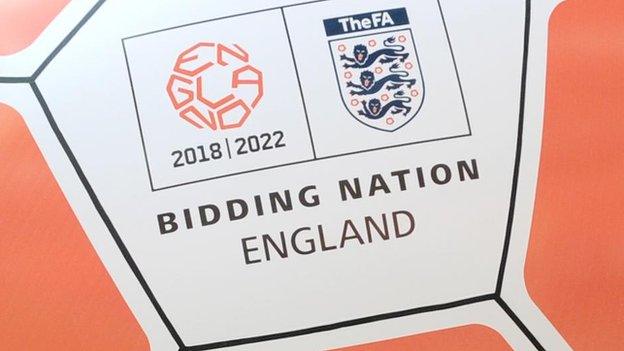Fifa corruption report: Is a World Cup boycott really possible?
- Published
David Bernstein calls for World Cup boycott
In calling for the organisation he used to lead to unite with Uefa and lead a boycott of the World Cup - as well as a breakaway from Fifa - former Football Association chairman David Bernstein has dared say what many have no doubt been thinking.
After all, if the FA is so outraged with the world governing body's handling of the investigation into the bidding for the next two World Cups, why not take drastic action and salvage some dignity by voting with one's feet?
Sadly for the FA, there are plenty of reasons.
Firstly, with £267m of debt still to pay off for the £757m Wembley Stadium, the FA simply could not afford to lose the revenue that comes with hosting World Cup qualifiers, not to mention the sponsorship that results from contesting one of the world's most fabled sports events.
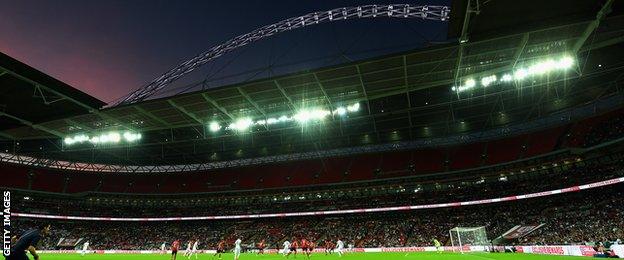
The FA are still paying off the cost of the new Wembley Stadium, which was opened in 2007
Breaking away from Fifa would have major ramifications, too.
A place on the International Football Association Board - the game's law-making body - would be sacrificed, for instance, while England representative teams at every age group would be unable to compete in their respective world championships.
As Bernstein himself suggests, the FA would never dare to go it alone. It would need the support of Uefa. But there are encouraging signs on this front.
Over the past weekend, the president of the German Football League warned that Uefa's 54 member nations could quit Fifa if Michael Garcia's full report into the 2018 and 2022 World Cups is not fully published.
Certainly, at a time when European football is already furious with Sepp Blatter - for standing for a fifth term as Fifa president after promising not to and for being expected to entirely rearrange its calendar to accommodate a winter World Cup in Qatar - you may think a breakaway has never been more likely.
After all, Europe has the Champions League and the European Championships, which attracts the best of the global talent pool.
Then there is the 'Nations League', which, from 2018, will attempt to make international friendlies more significant.
But it's unlikely that this new format will be extended to fill the vacuum left if European countries refused to take part in the World Cup.
David Bernstein on Fifa |
|---|
Fifa is a "totalitarian" set-up that reminds him of "the old Soviet empire" and is "beyond ridicule" |
The credibility of football is "suffering enormously" under the current Fifa regime |
Choosing Qatar to host the 2022 World Cup was "one of the most ludicrous decisions in the history of sport" |
With Russia hosting the next World Cup, it is hard to see them feeling the need to join a European rebellion.
As for Spain and Portugal, they have no problem with the report into allegations of World Cup corruption, not after they were cleared of any wrongdoing over their bid for the 2018 World Cup.
Then there is Uefa president Michel Platini.
Having voted for Qatar as 2022 World Cup hosts, it is not easy to see why he would back a boycott.
And if Uefa is so upset with Blatter, why isn't it putting up a credible challenger? Why is Platini himself not standing?
In my view, Uefa will use Fifa's current meltdown, not to turn its back on football's world governing body, but to strengthen its power and influence, especially when it comes to the presidential election next year and negotiations over 2022 scheduling.
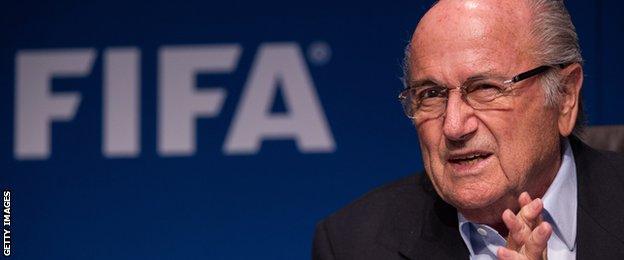
Sepp Blatter plans to stand for a fifth term as Fifa president
The FA knows this and that is why its plan is to bring about change from within.
Next year, it hopes to get its vice-chairman David Gill - already a member of Uefa's executive committee - on to the Fifa executive committee as the home nations representative.
If the FA was to suddenly agree with its former chairman Bernstein and call for a boycott on moral grounds, it would stand accused of hypocrisy.
After all, according to Fifa ethics judge Hans-Joachim Eckert, Garcia found that England's own £21m bid for the 2018 World Cup was guilty of breaking bidding rules.
And let us not forget that, as recently as 2010, the FA attacked the BBC over a Panorama programme that alleged Fifa corruption, such was its desperation to land the game's showpiece event.
Would Bernstein and the man who replaced him as FA chairman Greg Dyke be this outraged by Fifa if England had won? And would there by quite so much current media scrutiny of the 2022 World Cup hosts if Australia or the USA had won, rather than Qatar?
Almost certainly not.
Speaking to BBC sports editor Dan Roan in November 2014, England's 2018 boss Simon Johnson denied they flouted Fifa bid rules
Given all this, how easily could the FA claim the moral high ground?
One can understand why the FA feel hard done by following the Fifa report into World Cup corruption. Much of it is simply inexplicable.
Why, for example, was the English 2018 bid criticised when it was so obviously more open and transparent about what it did than the "highly uncooperative" Russians, for instance, whose computers were destroyed along with any potential email chains?
How can England be admonished for their $35,000 sponsorship of a Caribbean Football Union gala dinner when Qatar got away with a $1.8m sponsorship of the CAF Congress in Angola shortly before the 2010 vote?
Why did Eckert take it upon himself now - before Garcia has even had the chance to open proceedings against individuals suspected of wrongdoing - to recommend there was no need for any kind of re-vote?
Why was the evidence from whistleblowers dismissed so readily? Why was Blatter praised in Eckert's concluding sentences. And what exactly is it about Eckert's summary that Garcia has such a problem with?
These questions have left Fifa in apparent meltdown, the credibility of its landmark investigation - something that was meant to restore faith and trust in a scandal-plagued organisation - in tatters.
Its next move will be interesting, but football's world governing body will no doubt come under increasing pressure to publish the full Garcia report.
Nevertheless, thanks to Fifa's "Financial Assistance Programme" - the hundreds of millions of pounds that it hands out to regional confederations and national associations in the form of "development" payments - Blatter knows he has solid support in Africa, Asia and South America.
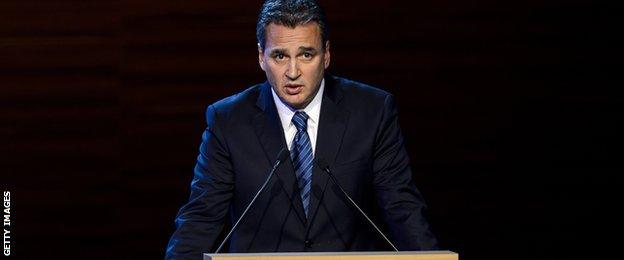
Michael Garcia, whose investigation took two years, said Fifa's report "contains numerous materially incomplete and erroneous representations"
A European breakaway would simply be portrayed as a selfish move by the wealthiest region in the sport.
Blatter will not lose any sleep over what his old adversary Bernstein says. Or about current FA chairman Greg Dyke calling the Eckert report "a joke".
Rumours coming out of the United States that the FBI are keen to press ahead with their own reported investigation into senior Fifa officials, however, should concern him more.
So should the fact that Dubai-based airline Emirates recently ended its sponsorship deal with Fifa, with South Korean electronics giant Samsung expected to follow suit. The continuous loss of the sponsors that generate billions of pounds for Fifa, rather than the threats of former FA chairmen, are what would really rattle Blatter.
Three years ago, when he was FA chairman, Bernstein made a lone appeal to postpone the unopposed re-election of Blatter in the wake of serious bribery allegations involving Fifa executive committee members Mohamed bin Hammam and Jack Warner.
The rebellion failed and left the FA more isolated than ever.
Just like then, Bernstein may now win praise for his principles, but this latest stand will almost certainly meet the same fate.
- Published17 November 2014
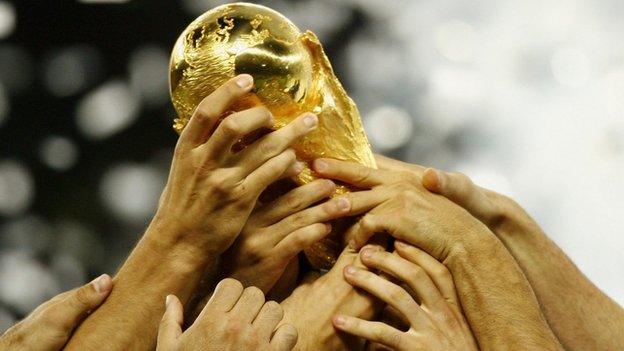
- Published14 November 2014
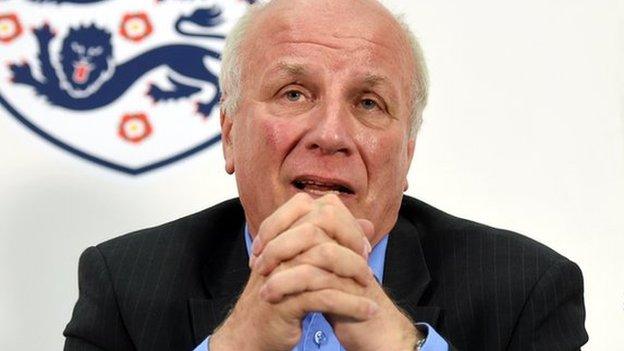
- Published13 November 2014
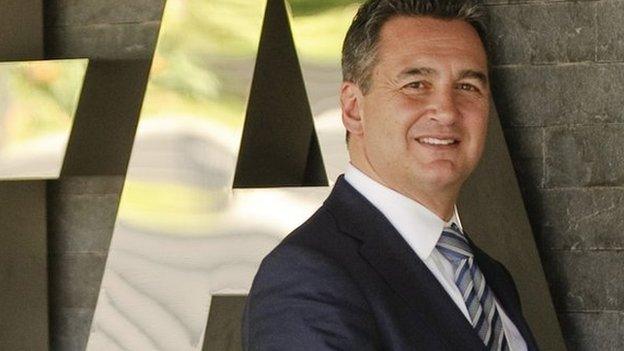
- Published13 November 2014
- Published13 November 2014
